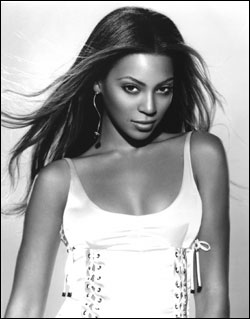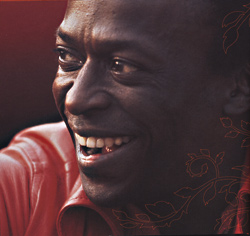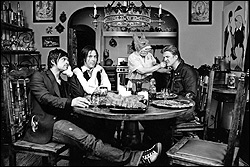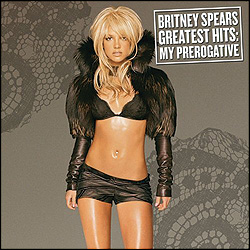In the pop world, apparently the only surefire way to prevent a man from pimping you is to objectify yourself first. Draping herself like a still-squirming chinchilla across Jay-Z in her video for “Crazy in Love,” Beyonc頣ould be Tawny Kitaen, Bobbie Brown, any late-’80s pinup who tarted for the camera while blow-dried boys played guitar. Except that it’s her song, and you can not only hear that fact in her voice, which races a fine, fine Chi-Lites horn sample to each of the chorus’ multiple orgasms, you can see it in her eyes, which flash with a defiant sense of self-possession even when she goes all Stripperella beneath a busted hydrant. Hell, she’s got more screen presence in one ass cheek than Jigga’s got in his whole body, and the poor guy resorts to blowing up a car in an unsuccessful attempt to catch our attention. The opposite of “whore” isn’t “virgin” anymoreit’s “diva.”
So far, so what? Nothing new hereshe’s a survivor, her body’s too bootylicious, shoes on her feet, she bought ’em, say her name, say her name, say her name. But as Beyoncé officially goes solo, she trades in the faux autonomy of Destiny’s Child for something more freakazoidal. With the Disney Channel market clearly subleased to baby sis Solange, Beyoncé fills the first half of Dangerously in Love (Columbia), her first solo album, with some of the funkiest heavy breathing in recent memory. As a kind of parental advisory, she cribs from “Love to Love You Baby” on the second track, “Naughty Girl”; next she’s drooling over a “Hip Hop Star,” asking, “Do I blow you away?” and chanting “Undress me” as OutKast’s Big Boi cheers her on with a lip-smacking, “Take off that tank top and pull off them drawers.” And B kicks it all off with “Crazy in Love,” an admission that she’s been hypnotized by some hot thang’s magic stick and can’t make her own decisions anymore. Maybe there is something missingsomething about independent women.
THE REAL QUESTION isn’t why Beyoncé’s now a hung-up boy toyit’s how such a malleable lump of multiplatinum plastic put off being cast in this mold for so long. After all, such male-identified quandaries are stock in trade for an R&B princess like Ashanti. As blank a slate as has ever topped the charts, Ashanti was Murder Inc. CEO Irv Gotti’s protégé, making her name by purring sweet nothings to hip-pop’s ickiest best sellers, allowing Fat Joe to straddle her on “What’s Luv?” and cooing, “I love it when you thug me, baby,” to Ja Rule. “Foolish,” the first single from her self-titled debut album, is the closest many of us will ever come to hearing a starlet talk in her sleep. Nature may abhor a vacuum, but that sure hasn’t held Ashanti back.
Working up a detailed critique of Ashanti’s Stepford diva persona might seem as pointedly pointless as, oh, holding a celebrity roast to lampoon Carson Daly. But in fact, on the new Chapter II (Murder Inc.), Ashanti emerges as her own woman. You can tell, because Ja Rule doesn’t show up even once. Actually, “emerges” is probably the wrong wordshe drifts through “Rock With U (Aww Baby)” like her own underpaid backup singer. But by murmuring to herself, she seems to create a safe, private space where beautified anonymity provides a defense against thug sexuality. A pretty girl with an ability to ingratiate herself with famous and powerful men, all Ashanti asks in return is to protect a tiny corner of her psyche, to retreat inside herself, into what guest interlocutors keep referring to as “Shanty’s World.”
BEYONCÉ, ON THE other hand, leaps into the battle of the sexes crotch first, flaying (for instance) the title ballad so viciously you never even think to ask what love’s got to do with it. Her attitude toward romance here is best summed up in a single line”Love is so blind, it feels right when it’s wrong”from the tellingly titled “Me, Myself and I,” the one track where she winds up on her own after the jerk walks out on her. “That’s all I got in the end,” she states of those three first-person pronouns. “From now on, I’m gon’ be my own best friend.”
Except it isn’t all she ever had. You remember her old group, which projected a female solidarity that was obviously a pretense long be-fore LaToya and Latavia were pink-slippedthere’s a reason Matthew Knowles never called his baby girl’s combo Destiny’s Children. But the pop-feminist euphemisms that DC fakedsisterhood, girl powerstill provided a welcome counterbalance to no-good machismo, a corrective that’s in notably short supply these days. “Crazy in Love” is Beyoncé’s equivalent of “Back in My Arms Again,” the Supremes song on which Diana Ross rejects “her friends’ advice”and a long, vital girl-group traditionbecause her heart knows better. But when B’s friends wonder, “Who he think he is?” of the lust object who runs their girl’s life, she offers none of Ross’ I’m-my-own-woman rationalization hereshe just has no choice.
Which means that video image of Beyoncé’s violently exerted self-control is essentially as a show of limitation. Beyoncé can’t afford to lose herself in the music when she feigns sexual obsession, because she’s moved beyond the girl-group ethos, and there’s no one left to catch her when she falls. And because no other female has got her back, Ashanti can’t risk allowing whatever personality she might be developing to burble up through the music. The most touching moment on Chapter II is a skit, where Ashanti’s sister drops by to sing along. For once, all too briefly, we hear two female voices in harmony. There are worse ideas.








